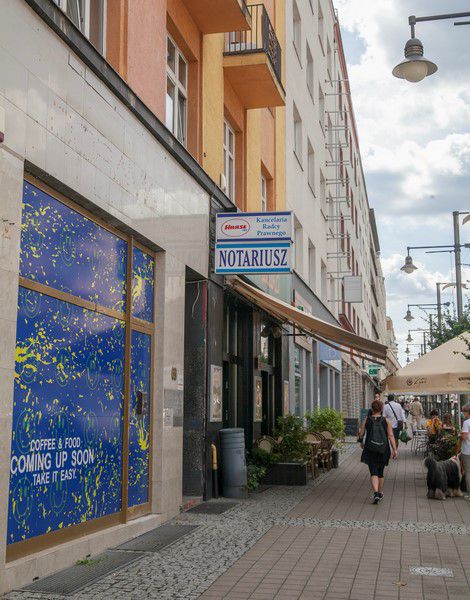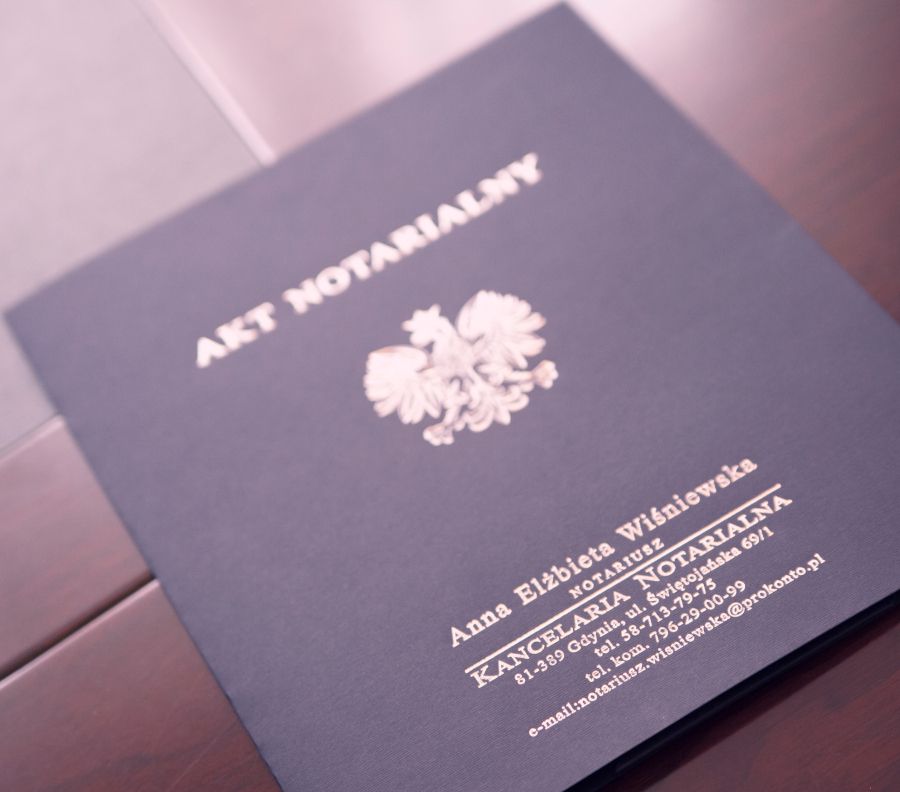NOTARY OFFICE
Visit my centrally located office in Gdynia, Świętojańska 69/1, for comprehensive notary services. The office is open Monday to Friday from 09:00 a.m. to 5:00 p.m., on Wednesday from 10:00 a.m. to 6:00 p.m. With prior arrangements, you can book an appointment outside of those hours. In justified cases it is possible to perform notarial services outside the notary office.
NOTARY
Having graduated from Law School at the University of Gdańsk and completed a full-time notary public traineeship program, I passed the notary exam and became a junior notary in a notary office in Gdańsk. I also provided assistant notary services for a number of other notary offices, where I worked on a wide range of contracts and participated in various transactions requiring the presence of a notary public. I opened my own notary office in Gdynia in 2009. With my vast experience, I guarantee the highest level of notary services and impartiality to properly secure the interests of both parties to the transactions. I prepare the contracts on my own with utmost diligence. I take the time to clarify any doubts you may have and the consequences of their transactions.
Your satisfaction and legal security are my top priorities.
SERVICES
A notary public provides the services listed in Article 79 of the Polish Notary Public Act of 14 February 1991.
The list includes:
Contracts regarding ownership of real estate property including
- sales,
- deeds of gift,
- divisions of co-ownership,
- divisions of community
Required documents
- the reference number of the title register kept for the property is enough for the notary public to verify the content of the entries,
- the grounds for acquisition of the real property (certified copy of a notary deed / final and binding court ruling establishing acquisition of inheritance / deed of succession),
- extract from the land register and a cadastral map extract,
- certificate confirming the designated purpose given to the plot(s) in the local zoning plan or certificate confirming that there is no zoning plan or, alternatively, land development decision,
- certificate confirming if the plot is situated within an area covered by revitalisation or within a special revitalisation zone,
- certificate of whether the plot is covered by a simplified forest management plan or by forest inventory as referred to in Article 19(3) of the Polish Forests Act of 28 September 1991.
Where the property has been acquired by way succession or usucaption, and after 2007 also by way of gift, free-of-charge termination of co-ownership, forced share in estate or bequest – please also provide a certificate issued by the head of the competent tax authority to confirm that the property was not subject to the inheritance and gift tax or that the tax has been fully paid or that the tax liability has expired.
Contracts regarding ownership of premises or cooperative rights to premises including
- sales,
- deeds of gift,
- divisions of co-ownership,
- divisions of community
Required documents
- the reference number of the title register kept for the premises / cooperative ownership right (where a title has been created for such a right) is enough for the notary public to verify the content of the entries,
- the grounds for acquisition of the premises (certified copy of a notary deed / final and binding court ruling establishing acquisition of inheritance / deed of succession /allocation from the housing cooperative),
- for a cooperative right to premises – a valid certificate, issued not more than 14 days ago by the housing cooperative, which lists the holder of that right, and if the notary deed is to include a request to file an application to create a title register for the cooperative right to premises, the certificate must include the number of the plot(s) on which the building with the flat in question stands, with the reference number of the title register specified.
Where the property has been acquired by way succession or usucaption, and after 2007 also by way of gift, free-of-charge termination of co-ownership, forced share in estate or bequest – please also provide a certificate issued by the head of the competent tax authority to confirm that the property was not subject to the inheritance and gift tax or that the tax has been fully paid or that the tax liability has expired.
On the day of signing the contract, the sellers should bring a clearance certificate regarding the fees connected with the premises and a certificate confirming that no one is registered as domiciled at the address of the premises.
Powers of attorney
A power of attorney may be a notary deed or it can be made in writing with a signature certified by a notary public, depending on the type of transaction it authorises.
Last wills
Read more...
According to Regulation (EU) No 650/2012 of the European Parliament and of the Council of 4 July 2012 on jurisdiction, applicable law, recognition and enforcement of decisions and acceptance and enforcement of authentic instruments in matters of succession and on the creation of a European Certificate of Succession (OJ L 201, 27.7.2012, p. 107 as amended), the law applicable to the succession as a whole shall be, pursuant to Article 21(1) of the Regulation, the law of the State in which the deceased had his habitual residence at the time of death, whether or not, as per Article 20 of the Regulation, it is the law of an EU Member State.
The testator may choose the law of their home country as applicable to all succession-related matters.
Last will may appoint a successor or successors in specific shares, the administrator of the estate or the executor of the will and it may include general or specific bequests as well as instructions. A notary public writes down the testator’s will after a face-to-face meeting held to identify the most beneficial solutions.
Deeds of succession
Required documents
- abridged death certificate of the testator,
- the last wills in the possession of the client,
- abridged copies of entries in vital records (birth certificates and for those who changed their names after getting married – marriage certificates),
- a document specifying the testator’s PESEL (Polish personal identification number),
- representations on acceptance or rejection of the inheritance, where applicable,
- agreements renouncing the inheritance, where such agreements have been signed between the testator and the heirs.
Please also specify the reference numbers of the title registers kept for the real properties owned by the deceased.
Marital agreements
Partnership agreements, articles of association for companies and foundations
Minutes from General Meetings and from Meetings of Homeowner Associations
Statements on submission to enforcement as to the obligation to pay or release a property
Certification of
- signatures,
- documents,
- date,
- life
Settlements
Read more...
The purpose of a settlement is to end any dispute that may exist or arise between parties on the grounds of a specific legal relationship and to guarantee the payment of the amounts owed. An amicable resolution helps save the time and avoid the stress inevitably connected with conflicts.
Acceptance of documents, money and securities for safekeeping
Issue of certified copies, extracts and excerpts
Read more...
The original notary deed signed by the transaction participants and by the notary public is kept in the notary office for 10 years. After that time, notary deeds are deposited in the district court having jurisdiction over the notary office. Certified copies of notary deeds are issued to the parties to the transaction and to those whom the deed specifies as authorised to receive them. Article 110(2) of the Polish Notary Public Act provides for a possibility of obtaining a copy based on a Regional Court order.
Advice regarding the intended notary transactions is provided free of charge, once an appointment has been made.
A FOREIGNER BEING THE CLIENT OF A POLISH NOTARY







